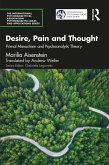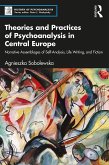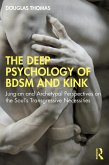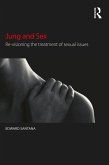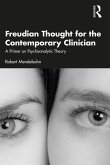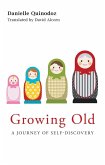Dieser Download kann aus rechtlichen Gründen nur mit Rechnungsadresse in A, B, BG, CY, CZ, D, DK, EW, E, FIN, F, GR, HR, H, IRL, I, LT, L, LR, M, NL, PL, P, R, S, SLO, SK ausgeliefert werden.
"Desire, pain and thought" is a remarkable and much needed book, not only for new and seasoned psychoanalytic readers but also for all those interested in better understanding how the human mind works. Marilia Aisenstein is one of our main psychoanalytic thinkers, and she shows masterfully how to blend theory, clinical examples and different expressions of culture, and the evolution of the process of thought. The presence of primal masochism and it's different levels and is central to human existence. I strongly recommend the reading of this book. Aisenstein conducts us with elegance and erudition through the labyrinths of pain till the pleasure of thinking." - Cláudio Laks Eizirik, Training and supervising analyst, Porto Alegre, Professor Emeritus of Psychiatry, Former President of IPA
"In her characteristic lucid style, Marilia Aisenstein brilliantly delves into the concept of masochism, leading to the discovery of "primary erotic masochism". This ground-braking idea becomes a "guardian of life". It brings a complexity to understanding masochism that is essential for all analysts". - Fred Busch, Author of Creating a Psychoanalytic Mind, and A Fresh Look at Psychoanalytic Technique.
"The question of masochism represents the navel of psychoanalytic theory: this is the profound premise of Marilia Aisenstein's book, whose imaginary interlocutors are Michel Fain, Benno Rosenberg and André Green. We are taken on a voyage guided by the creativity and psychoanalytic sensitivity of the author and stimulated by her masterful knowledge of literature and philosophy, as well as by her commitment to the clinic. The author emphasises the crucial importance of a masochism "guardian of life", which binds destructiveness and is at the root of the capacity for thinking. She suggests that pain is at the source of desire, which leads to thought: "thinking is an act of the flesh" that requires transformation into language. The structure of desire is masochistic, as desire is inconceivable without cathecting waiting. After reading Marilia Aisenstein, pain, desire and thought become intrinsically linked . With her extensive experience of working with traumatized and psychosomatic patients, she offers us a new way of thinking about the various forms of the destruction of thought-processes, from the clinic to social processes." - Rosine Perelberg, Training Analyst, past President of the British Psychoanalytical Society



